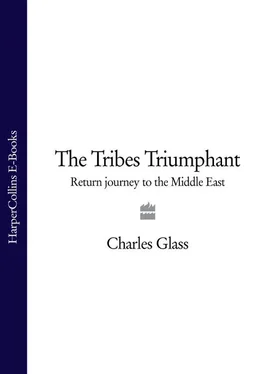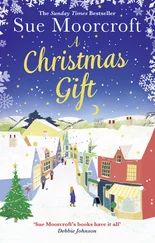‘We were at home until the Israelis got close,’ Usama said. ‘Then a car bomb destroyed most of our house.’ The Israelis later admitted they had used car bombs in Beirut to assassinate Palestinian leaders. Sharon said later that his only regret about Lebanon was that he had not ‘liquidated’ the PLO leader, Yasser Arafat, when he had the opportunity.
After the car bomb, Usama moved into a friend’s apartment. While the Israeli army looted the Research Centre on the first floor, soldiers broke into all of the flats above. ‘They walked into our house,’ Usama said. ‘They shat on things. One had to appreciate their ability to shit on top of a refrigerator. They tore a lot of books. It was more vandalism than theft.’
Usama’s outrage was nowhere evident in the telling. His conclusion: ‘I don’t think it was fun, to put it mildly.’ He had left West Jerusalem in 1967. In 1982, he stayed in Beirut. Eventually, after the Lebanese suicide bombings, the Israelis were the ones to leave. Usama restored his flat, replaced his books and continued to teach. In 1983, the largest car bomb of all demolished his building. Twenty-two people died, including the wife of the Research Centre’s director, Sabry Jiryis. Jiryis had grown up in Israel, spoke and wrote Hebrew and had been in Israeli prisons for non-violent political activity. A fine writer and scholar, he was among the few Palestinians to urge his people to understand the Israelis, to compromise, to reconcile. After his wife’s funeral, he left Lebanon for another exile.
The bombing wounded Usama and his wife. Six months later, when they recovered, they moved to Jordan. Their flat on the ground floor of a new stone building could have been in Jerusalem, so much had its walls and floors and shelves been covered in Khalidy memorabilia. ‘This was the grandfather of my grandfather’s father,’ Usama indicated a reproduction of an old painting of an old man attired in the style of his Sultan – a dark robe, a turban, a beard. ‘Mohammed Ali [Khalidy] was the deputy judge of Jerusalem. The chief justice was a Turk, who never came to Jerusalem. So, Mohammed Ali was in effect the chief judge. He died in 1862.’ To be a jurist in the Ottoman Empire was to be a scholar, and a Muslim judge adhered to one or another of the schools of legal philosophy that defined the nature of one’s belief in Sunni Islam. The law had been as significant in the consciousness of an Ottoman Sunni Muslim, whether Turk, Kurd or Arab, as it remained for strict Orthodox Jewish rabbis. The law and the devout study of law – law giving, law making, legal interpretation, the source and legitimacy of legal precepts – involved not only jurisprudence, but philosophy, history and theology. The law made the Khalidys into scholars, and the tradition persisted among the latest generations – academics, but not a lawyer among them.
Usama Khalidy did not subscribe to the Islamic school that proscribed and condemned visual representation of the human form. He lived surrounded by family portraits of long-dead Khalidys in Ottoman robes of office and of his two modern and wildly beautiful daughters. I asked about a black and white drawing propped against the books behind him. I’d been looking at it for some time: six men on their feet, four seated in front, all eyes fixed on the artist. ‘This is one of the oldest pictures in the Middle East of my ancestors,’ Usama said.
The ten, who looked like a difficult jury to impress, divided into two phases of Ottoman history. The elders, frail in white turbans atop snow-white beards, had grown up in the last years of a Sultanate that had not absorbed the cultural lessons of its military defeats by the once-insignificant Christian kingdoms of Europe: in Greece, in the northern Balkans, in much of North Africa. The younger men, all fresh and trendy in sporty tarboush and twirling moustaches, were coming of age when the Sultan understood that weakness required concessions to the foreigner and new arrangements with the more dissatisfied natives. In the mid-nineteenth century, those Khalidys in the fezzes were the new men of reform, of progress, of enlightenment. The Sultan would govern under the new men, reorganize the empire, invite the hated Europeans to train his army and buy the new steel cannon of Krupp and the Maxim gun. Soon, the Sultan’s subjects would be wearing trousers and conspiring to depose him.
‘This is our ancestor, Yusuf Dia Khalidy,’ Usama spoke with a certain pride of this man, one of the oldest in the picture. ‘Yusuf Dia was sent as a judge to Kurdistan. He wrote the first dictionary of the Kurdish language.’ The dictionary was in Kurdish and Arabic, languages that flourished under the Ottomans, but which had been banned – except for prayers in Arabic – in the modern Turkey that Moustafa Kemal Atatürk created after the First World War. Usama said I should buy a copy of the dictionary, still in print from the Librairie du Liban, when I reached Beirut.
Usama’s two daughters, Mouna and Ramla, lived in Beirut with their husbands and children. Ramla, Usama said, was an old Arab name, so rare that I’d not heard it except as the name of an Arab town in Palestine. More Christians than Muslims, he said, gave their children the ancient names. The Christians were more tribal, following the traditional pattern of marriage within their Jund. Jund , classical Arabic for army, was also a division of land: great west – east stretches between the Mediterranean and the desert, self-sufficient and parallel regions of fish and commerce beside the sea, fruit and timber in the coastal mountain range, wheat and vegetables in the fertile plain, and, at the desert’s edges, the Bedouins’ meat, milk, yoghurt and cheese. Jund Dimashk went from Beirut over Mount Lebanon to Damascus and the Syrian Desert. To its south were Jund al-Urdun and Jund al-Falastin. There would be more family ties hundreds of miles across the Jund , from Hebron over the Jordan to Kerak or from Jerusalem to Salt in Jordan, than between towns a few miles north and south of one another in different Junds. The Christians, few as they were, preserved tradition. Usama said that they were the last in Jordan to perform a ritual operation on their babies to remove the uvula from inside their mouths. ‘They say it improves their speech,’ Usama explained. ‘I was told there is a Yemeni tribe who do that as well. It’s similar to circumcision.’
Usama had retired, but for him retirement was a mission. ‘Traditionally, when people became my age, sixty-nine, they had the job of deciding who married whom,’ he said, implying that it was not a role for him. ‘Of course, they hardly ever became my age.’ Rather than play patriarch, he studied the flora and fauna of the desert. The Jordanian government had set aside 12,000 square kilometres for the Badia Research Project to document aspects of desert life. ‘I’m interested a bit in plants,’ he said, ‘for example, to find out how to grow black iris out of seed. I’ve developed a method for extracting the smell of some desert plants. Wait a minute.’ He left the room. I examined his books. Most were science, biology or chemistry, but there were also Arabic – English dictionaries, a book on Ottoman architecture, Tony Clifton’s God Cried , about Israel’s 1982 invasion of Lebanon, Jonathan Randal’s Going All the Way on Lebanon’s civil war, and a book of old photographs of Palestine, Before their Diaspora , edited by Usama’s brother Walid. I was looking at the last when Usama returned with a vial of black liquid that looked like molasses.
‘Put your finger in,’ he ordered, delighted to be teaching. ‘This is the essence of a desert plant, from near the Iraq – Syria border.’ In Arabic its name was shih. Usama leafed through a botanical index. ‘Here it is in English, it’s artemisia. Herba alba. It’s a kind of wormwood.’ My hand would smell of wormwood for a week.
Читать дальше












